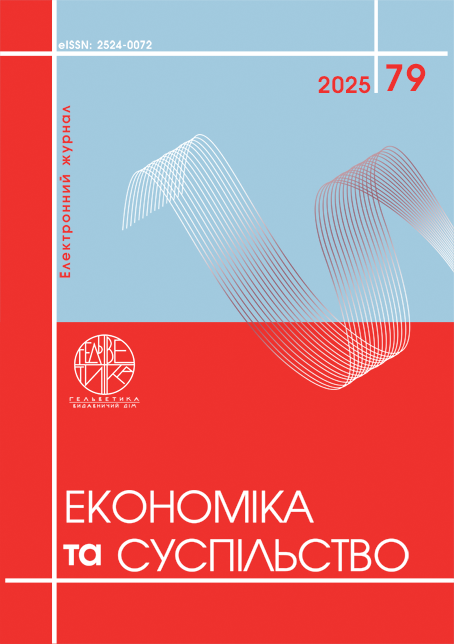RISK-ORIENTED APPROACH TO MANAGING THE ECONOMIC AND ENVIRONMENTAL SECURITY OF ENTERPRISES UNDER MARTIAL LAW
Abstract
The study focuses on analyzing environmental risks faced by industrial enterprises under martial law conditions. It systematically categorizes risks based on their sources, mechanisms of realization, and potential consequences, presenting a comprehensive classification. Specific threats were identified for various industrial sectors, including chemical, energy, and oil refining industries, highlighting their potential for regional and national environmental impacts. Five alternative strategies for managing economic and environmental security were developed: proactive, relocative, adaptive, minimalist, and innovative. Each strategy is tailored to specific operational conditions, with detailed advantages and limitations outlined. A multi-criteria analysis evaluated these strategies based on parameters such as environmental security, economic efficiency, technical feasibility, and adaptability, revealing the adaptive strategy as the most effective (scoring 8.0) due to its balance of security, cost-effectiveness, and flexibility. The relocative strategy, while ensuring the highest economic and environmental security, scored lower due to significant economic losses. A decision matrix was constructed to guide strategy selection based on the level of military threat and industry-specific factors, recommending adaptive strategies for most scenarios and evacuation for high-risk conflict zones. The findings provide a practical framework for industrial enterprises to mitigate environmental risks while maintaining operational viability, offering actionable recommendations for policymakers and industry leaders to enhance environmental resilience in wartime conditions.
References
Sustainable Energy Safety Management Utilizing an Industry-Relative Assessment of Enterprise Equipment Technical Condition / H. Hrinchenko et al. Sustainability. 2024. iss. 16. DOI: https://doi.org/10.3390/su16020771
Klymenko V. Public administration of environmental safety in Ukraine and EU countries. Law. Human. Environment. 2024. iss. 15. P. 9–30. DOI: https://doi.org/10.31548/law/4.2024.09
Assessing the state of business energy resilience in the context of crisis management tasks in wartime / L. Ligonenko et al. Eastern-European Journal of Enterprise Technologies. 225. iss. 4. P. 70–78. DOI: https://doi.org/10.15587/1729-4061.2025.336529.
Yang H., Zhu X., Chen C. The Impact of Environmental Regulations on Technological Progress of the Pesticide Manufacturing Industry in China. Sustainability. 2025. iss. 17. DOI: https://doi.org/10.3390/su17104550
Dyuhovanets O., Erfan V., Parfeniuk Y. Organization of risk management at an enterprise during the war. Visegrad Journal on Human Rights. 2023. iss. 3. P. 16–21. DOI: https://doi.org/10.61345/1339-7915.2023.3.3
Zelisko N. Relocation of enterprisesas a tool of economic security under conditions of martial law. Bulletin of Lviv National Environmental University. 2023. P. 38–43. DOI: https://doi.org/10.31734/economics2023.30.038
Stasiuk N. International legal and national mechanisms for overcoming the environmental consequences of the armed aggression of the Russian Federation against Ukraine. Law. Human. Environment. 2024. iss. 15. P. 68–84. DOI: https://doi.org/10.31548/law/3.2024.68
Evaluation of Environmental Security of Ukraine during the Russian Invasion: State, Challenges, Prospects / V. Shvedun et al. Journal of Environmental Management and Tourism. 2023. iss. 14. P. 787-798. DOI: https://doi.org/10.14505/jemt.14.3(67).18
Hutsu A., Lukianchuk O., Akuliushyna M. Features of risk management in the enterprise under the conditions of martial law state. Економіка. Фінанси. Право.. 2024. iss. 6. DOI: https://doi.org/10.37634/efp.2024.6.9
Copyright (c) 2025 Ірина Єпіфанова

This work is licensed under a Creative Commons Attribution 4.0 International License.


